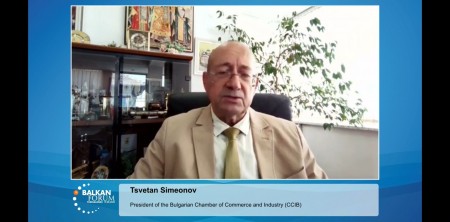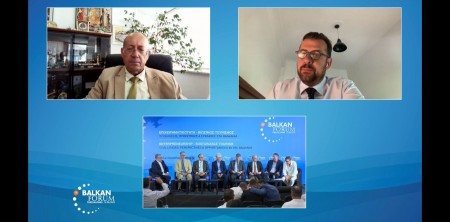The President of the BCCI, Mr. Tsvetan Simeonov, Participated in the BALKAN FORUM on “Entrepreneurship – Sustainable Tourism”
The event brought together representatives from institutions across Balkan countries—both EU and non-EU members—chambers of commerce and industry, business associations, bilateral chambers and trade bodies, research institutions, technology providers, investment groups, banks, and relevant public institutions and ministries involved in entrepreneurship and tourism.
Two thematic sessions were held during the forum:
- Entrepreneurship as a Driver of Growth in the Balkans – Challenges, Prospects, and Opportunities
- Sustainable Tourism in the Balkans – Challenges, Prospects, and Opportunities
The President of the BCCI, Mr. Tsvetan Simeonov, participated in the first session, where he highlighted that entrepreneurship has already been introduced as a subject from the first grade in the Bulgarian schools. Entrepreneurship education is age-appropriate—using gamified learning models in early grades, while in higher grades students simulate real companies and non-profit organizations to support business development.
Mr. Simeonov emphasized the importance of internships and practical training for students in real businesses. For many years, BCCI has provided internship opportunities to students from two vocational high schools in Sofia—the National Financial and Business High School and the National Trade and Banking High School—helping students gain practical skills.
He also shared the significant achievements of BCCI in promoting women’s entrepreneurship, particularly through the work of the Entrepreneurship and Startup Council at BCCI. The council’s practical results were presented during the forum.
The Council works to foster sustainable Bulgarian entrepreneurship by implementing new business models and best practices that lead to the creation of high-efficiency businesses and innovative products.
In cooperation with the “For the Good Practices in Business” Foundation and the “Entrepreneurs BG” network, the Council focuses on three main areas: women in business, education, and entrepreneurship.
Some of its key goals include improving the business environment in Bulgaria, promoting women-led enterprises, highlighting success stories in business, and supporting education by strengthening direct connections with the business community. This is achieved through mentoring, integrating entrepreneurs and managers into school and university programs, and more.
A National Mentorship Program for Women Entrepreneurs has also been developed. It targets women of all ages—those starting their own businesses, those looking to grow and expand their networks, and those in middle and senior management acting as intrapreneurs. The program is now in its fifth edition, with experienced female mentors supporting participants in realizing their entrepreneurial aspirations.
During the second thematic session, Greece’s tourism sector was presented. Deputy Minister of Tourism Anna Karamanli stated that the sector started 2025 on strong footing, with a significant increase in visitor numbers and revenues.
Karamanli emphasized the growing importance of extending the tourist season and deepening regional cooperation to sustain this momentum.
“The first five months of 2025 showed exceptional growth,” she noted, citing double-digit revenue increases in the last quarter of 2024 compared to the previous year.
“In 2024, inbound tourism contributed nearly €22 billion directly to the Greek economy—an increase of over €3.5 billion compared to 2019,” she added.
Karamanli identified the Balkans as a key market—especially for Northern Greece’s economy—highlighting the importance of car travel to Central and Eastern Macedonia and Thrace from countries like Romania, Bulgaria, and Albania.
Given the unique cultural and geographical identity of the Balkan Peninsula, Karamanli advocated for a unified regional tourism development model. Such an approach would support the goal of building a year-round, inclusive tourism industry that benefits local communities, protects the environment, and preserves cultural identity.
The forum provided a valuable platform for numerous representatives from governmental and non-governmental organizations across the Balkans to share their perspectives on key issues.

